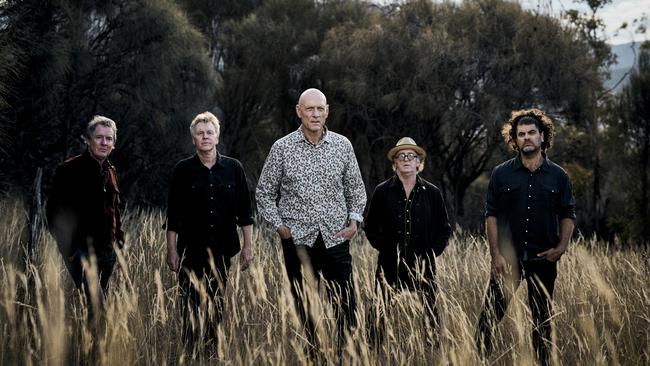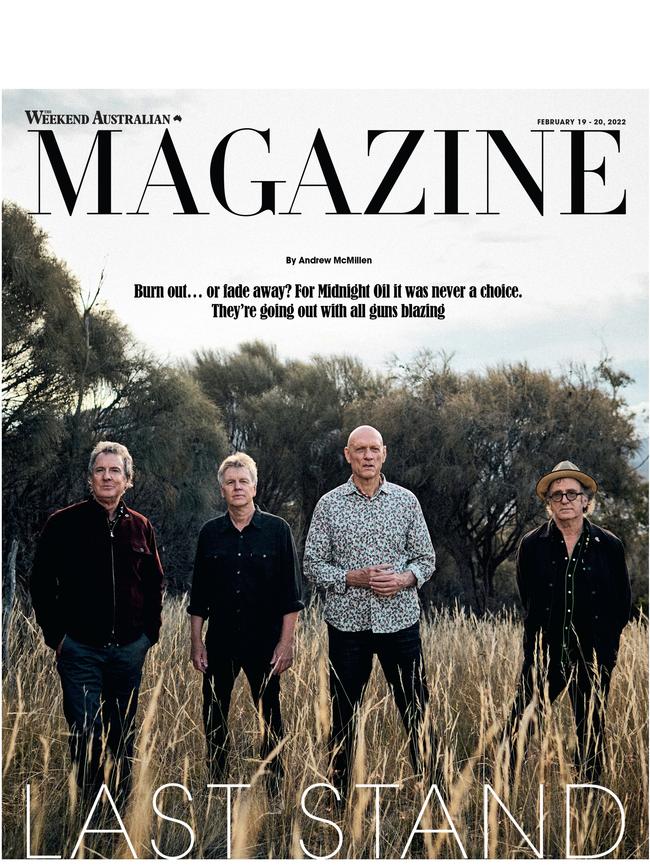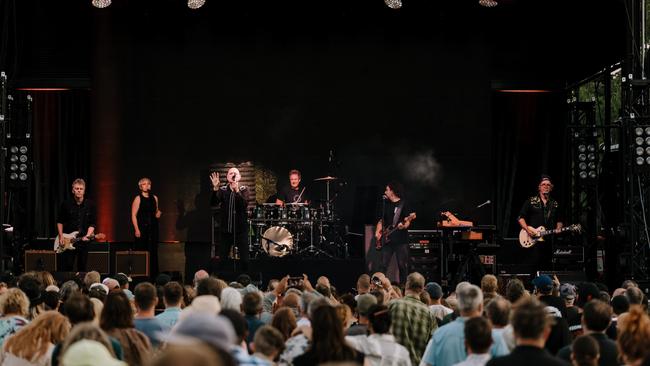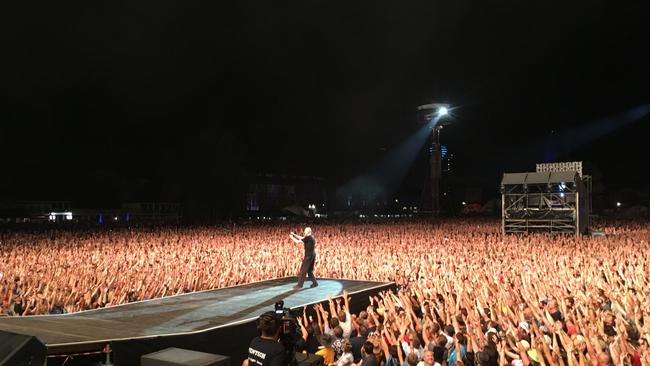Peter Garrett on Midnight Oil’s Resist album and Xi Jinping’s legacy in Last Frontier
Almost 50 years since Midnight Oil started as an angry young band shouting idealistic lyrics in the pubs of Sydney, their hard-rock prophecies are increasingly becoming realities.

Almost five decades since Midnight Oil started as an angry young band shouting idealistic lyrics about changing the world in the pubs of Bondi and Sydney’s northern beaches, their hard-rock prophecies are increasingly becoming realities.
Now that the angry young men have grown into rock’s elder statesmen and become one of Australia’s most successful international bands, their mantras of climate change and indigenous reconciliation have gone from relative obscurity on Double J to matters of mainstream discussion on morning breakfast on Radio National.
On climate, both major parties will take a net-zero emissions target by 2050 to the looming federal election. And on Thursday Origin Energy announced the nation’s biggest coal-fired power station would retire ahead of schedule.
Part way through its final national tour in support of its 13th and perhaps last album, the Sydney-born quintet is not going out quietly: instead, it is keeping its finger firmly on the nation’s cultural pulse.
It’s there in the first moments of Rising Seas, the pointed album opener: “Temperature rising, climate denying / Fever is gripping, nobody’s listening,” sings Peter Garrett, the former federal environment minister.
“We’re a contrary bunch of bastards,” says guitarist and songwriter Jim Moginie.
Oils music, he says, is “about something real”. “We want to make it mean something to people and deliver that, and not just be a pop group,” he says.

Even after 46 years as its frontman, though, it’s still a hard task for Garrett to get his songs out of his notebook and onto the band’s records. Such is the challenge of competing with the likes of Moginie and drummer Rob Hirst, who have supplied the lion’s share of the songs in the band’s long career.
But 13th album, Resist, released on Friday, closes with a bracket of Garrett-penned tunes. Or, as he puts it with a toothy grin: “I managed to crowbar a few in.”
At the beginning of Midnight Oil’s final national tour in Tasmania last month, the band members – including new bassist Adam Ventoura – spoke exclusively with The Weekend Australian Magazine for a series of wide-ranging interviews reflecting on the new work and this final national run of 19 concerts.
In sum, Resist is a fiery summary of what the Sydney-born rock band has always been about, lyrically and musically, all the way back to its formation in 1976 and after its global breakthrough in 1987 with Beds Are Burning.
With songs centred on subjects including asylum-seeker policy and water theft, Resist reflects Midnight Oil’s longrunning artistic vision, which has tended to combine anger with hope by matching political statements with ear-catching melodies and danceable beats.
Of Garrett’s crowbarred new work, though, the most fascinating track is album closer Last Frontier, which begins with a peculiar sound collage that samples voices speaking Chinese and Portuguese, as well as the Malaysian-Australian singer Kamahl.
The arrangement then breaks into a jaunty rhythm that’s heavily reliant on Moginie’s piano. The chorus contains one of the singer’s strongest vocal performances, and its lyrics centre on a character named Barry, a manual labourer who was Garrett’s distant cousin.
“He was an Australian working man who was actually very sensitive and felt lots of stuff,” said Garrett.
“It’s been quite a blokey culture in some parts of the country, and I just wanted to talk about someone who’s an archetypal person,” he said. “Obviously, I don’t fit into that character, so I have to find someone else who I think is a bit like that, and then try and write to that.”
“The other stuff is just playing around a little bit with sound – and sneaking a few subversive ideas and thoughts in, as well.”

One of those subversive ideas appears on the 10th track Undercover, where Garrett sings, “The Chinese empire’s up and fighting / They got their weapons hi-tech spying / I get the feeling there’s no hiding / As time goes by.”
Asked about these lines, he says, “Somewhere in this record, we really had to draw people’s attention to the fact (Chinese President) Xi Jinping is going to be the dominant political historical figure in our lifetimes; he already almost is, and certainly will be once we’re gone.”
The songwriter was moved to write about Jinping’s legacy, as well as “understanding China, the Communist Party, its aspirations and his extremely clearly expressed nationalistic ambitions and thoughts about dissent, and freedom of speech – because he’s an extreme totalitarian and very, very dangerous leader.”
With a grin, Garrett says, “Now, if you wrote a song with those things in the verses, it wouldn’t make the cut – so you’ve got to do it another way.”
To read more about Midnight Oil’s final national tour, which continues in Newcastle on Wednesday, pick up The Weekend Australian Magazine on Saturday. Resist is also reviewed in The Weekend Australian Review on Saturday: read Phil Stafford’s critique online here.
More Coverage





To join the conversation, please log in. Don't have an account? Register
Join the conversation, you are commenting as Logout